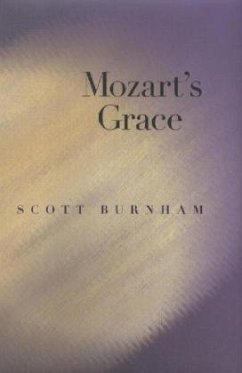It is a common article of faith that Mozart composed the most beautiful music we can know. But few of us ask why. Why does the beautiful in Mozart stand apart, as though untouched by human hands? At the same time, why does it inspire intimacy rather than distant admiration, love rather than awe? And how does Mozart's music create and sustain its buoyant and ever-renewable effects? In Mozart's Grace, Scott Burnham probes a treasury of passages from many different genres of Mozart's music, listening always for the qualities of Mozartean beauty: beauty held in suspension; beauty placed in motion; beauty as the uncanny threshold of another dimension, whether inwardly profound or outwardly transcendent; and beauty as a time-stopping, weightless suffusion that comes on like an act of grace.
Bitte wählen Sie Ihr Anliegen aus.
Rechnungen
Retourenschein anfordern
Bestellstatus
Storno








